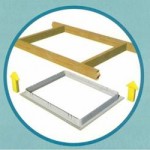Loft Ladder Measurements
By measuring up your hatch and surrounding area, before purchasing a ladder, will determine which type of ladder you can actually fit into the intended space. Just because you like the ladder, does not mean it will fit, so your loft ladder measurements are important.
Start by taking a measurement of your Floor to Floor (A). This the floor on which the feet of the ladder will rest, to the floor or top of joist timber above.
Then your floor to underside of ceiling measurement (B). Again this is the floor on which the feet of the ladder will rest, to the underside of the ceiling above.
If you take Measurement (A) from (B). This will give you measurement (C) which is the depth of the hatch. Measure the length (D) and width (E) of the hatch.
This is the current or maximum size of the 'hole' that could be made in your attic floor to accommodate your loft ladder; this may be bigger than the size of your existing opening if you have one.
Consider the position of joists and other obstructions such as cables, or pipe work that put an obvious limit, on how large the opening can be made. Also consider what your ceiling is made from, (plaster board or worse lathes & plaster can be a job for the professionals).
Measure the Horizontal (F) and Vertical (G) Clearance. Measure from the intended hinge point vertically to the nearest obstruction, then make a note, then again measure from the hinge point horizontally back into the attic to the nearest obstruction, (tank, pipe work, large roof timber etc) again make a note. These loft ladder measurements are important to make sure it fits.
Landing Space (H) and swing clearance (I). Landing space is measured by taking a line from the hinge of the hatch, vertically to the floor, then to the intended resting place of the feet on the floor, once the ladder is fully extended (normally referred to as the going). The distance is measured horizontally along the floor. Swing clearance, is the 'arc' through which a folding ladder will move as they are retracted into the attic. You need to measure the distance from the hinge end of your hatch to the nearest obstruction, usually a wall.
Weight of Individuals (J) Weigh yourself or the heaviest person in the house who might use the ladder and then add these to your loft ladder measurements, and add a weight approx 20lbs of additional weight (boxes etc you might carry up the ladder). You now have all the loft ladder measurements, dimensions and weights to hand to make the decision on which ladder will fit into the area you want. Check through the specifications of the loft ladder listed to see if they match up to your requirements. If you wish you can always talk with one of the experts on the sales team by calling 01271 858698.






